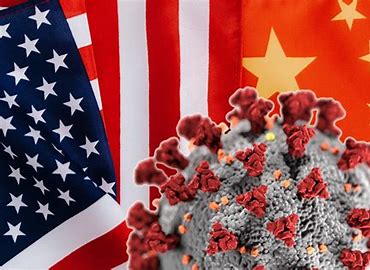Politicization of the Pandemic Raises Alarm for China
Time: 2023-01-27 Author: Nian Peng
Politicization of the Pandemic Raises Alarm for China
Nian Peng
Since the outbreak of the pandemic, China has become a main focus of the pandemic fight in the world. The western countries, represented by the US, in particular, always deflect blame on China’s anti-pandemic measures. During the early days of the pandemic, the United States clamored to trace the original source of the coronavirus disease and pointed the finger at China. After China implemented the dynamic Zero-COVID policy, the United States accused China for violating human rights and pressured it to loosen the anti-COVID policy.

▲pandemic fight between China and the United States
Now, China eventually abandoned the controversial Zero-COVID policy and suddenly reopened the borders in early 2023. Yet, not only had the United States not support China’s new open policy aiming at normalizing the social order and people-to-people exchanges, but imposed curbs on travelers from China. Followed by the United States, other Western countries, mainly including Italy, the UK, France, Spain, also took similar actions. Italy is the first Western country that imposed restrictions for Chinese tourists and called on traveling restrictions from EU.
The anti-pandemic policy taken by the West to limit the entrance of Chinese tourists has caused rising resentment in China. On one hand, it refreshed the Chinese painful memory of the West’s criticism of the outbreak of the COVID pandemic in Wuhan three years ago. On the other hand, it frustrated the Chinese tourists who expected to travel abroad.
In response, Chinese Foreign Ministry spokesman Wang Wenbin said that for all countries, COVID response measures need to be science-based and proportionate without affecting normal personnel exchanges. In fact, other Western countries such as Portugal, Switzerland and Poland didn’t take new entry restrictions on the travelers arriving from China. Even Italy, the first European country imposes mandatory COVID tests for travelers from China, confirmed that no new COVID variant has been found from Chinese tourists.
So far, both the World Health Organisation(WHO) and the European Centre for Disease Prevention and Control(ECDC) have not detect new COVID variant from Chinese tourists. And more important, the core indicators of the Omicron such as virus toxicity and mortality weakened so much, which would not affect the public health in the West which has developed herd immunity to Omicron. So, at least for now, there is no need to overestimate the pandemic threat from China.
Instead, new COVID variant called XBB with higher toxicity and mortality has been found in the United States and imported to China recently. Initially, China has not imposed new restrictions on the arrivals from the United States as few XBB have been detected in local communities. But as more XBB have been found, China introduced new COVID-19-related travel measures for individuals arrived from foreign countries who are required a negative nucleic acid test issued within 48 hours. Moreover, China has retaliated against Japan and South Korea because the two countries launched discriminatory policy towards the Chinese tourists. So, will there be more strict traveling limitations on foreigners if a new round of pandemic caused by XBB happened in China(although Chinese health officials said possibility of this is low) or more discriminatory policy on Chinese travelers issued by the West?
Except the pandemic threat, the China-US relations are troubled with the epidemic prevention policy. The U.S. President Joe Biden repeatedly raised concern about China’s handling of its COVID-19 outbreak after the WHO said Beijing was under-reporting virus deaths. Soon after that, Chinese Foreign Ministry spokeswoman Mao Ning refuted that China has shared relevant information and data with the international community, including the WHO and the United States, in an open, transparent and responsible manner. She also called on the United States avoiding remarks and actions that politicize the epidemic. More recently, Chinese Foreign Ministry spokesman Wang Wenbin required the United States to share pandemic related data with WHO and international community. So, what will be the next step of the United States to squash China and how will China to response to it?
The ongoing China-US rivalry on pandemic raises the alarm for China. The country still has a long way to compete for international discourse on the pandemic. At the beginning of the outbreak, because of the poor response from the local government and the media public opinion aphasia from the state, China was criticized heavily by the West, particular the United States.
After China finally gave up the disputed Zero-COVID policy and normalized the personal exchanges with the world, it is still not be trust and continued to be blamed by the West. It is evident that there will be a transition period after China reopens its borders, in which the West will gradually accomodate to China’s normalization. In that case, China needs to strengthen domestic pandemic prevention and control, enhance transparency of the pandemic, cautiously implement retaliation policy, and more importantly, improve the skills of the discourse of the pandemic and public opinion struggle with the West.
![]() RCAS Commentary-Politicization of the Pandemic Raises Alarm for China.pdf
RCAS Commentary-Politicization of the Pandemic Raises Alarm for China.pdf

